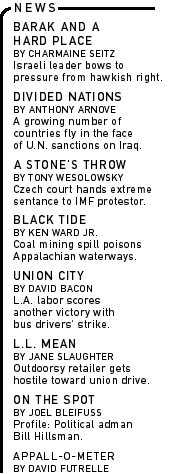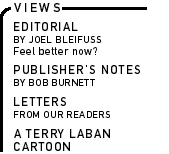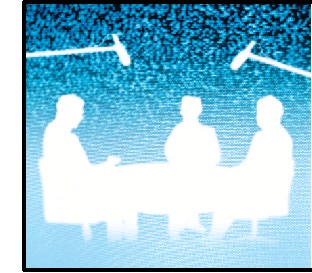
|

|

|

|

|
| |
|
|
|
By the time you read this, we will have been awash in much hand-wringing about the media's collective behavior on Election Night. There will be much breast-beating over the news media's reliance on exit polls, and over calling races too soon, only to have to rescind projections a few hours later. I'm especially hoping for a pharmacological analysis of Dan Rather's intake on Election Night--what was he on, anyhow? "This is the dance of democracy," he hyperventilated as midnight approached. Then morphing into electronics salesman mode, he added, "This day, votes only talk, everything else walks." The race in Florida, gushed Rather, was "hot enough to peel house paint." And although he too lobbed the requisite number of sports metaphors ("Gore hasn't
And what were those graphics? Tim Russert on NBC kept bringing out his little white greaseboard that flashed glare into the camera while he wrote his latest illegible electoral calculations on it with magic markers. Over on CBS, the visuals were just as high-tech. As we looked at an electoral map of the country, Rather's giant hand, holding a No. 2 pencil as a pointer, entered the screen to identify states, reminding us of the hand of destruction that used to hold Mr. Bill on Saturday Night Live. Yes, the coverage was irresponsible and surreal. But the real story about the media and Campaign 2000 occurred months and weeks before Election Night, and remains the most important story for progressives after the election: the total conquest of political commentary by the right. What this meant for the Bush campaign was simple. A man of very limited experience and knowledge with an appalling record as governor, a man who, frankly, started making Dan Quayle seem like a policy wonk, had a fifth column working on a daily basis to legitimate his candidacy. For millions of us, this led to an eerie sense, especially during the debates, of a complete disconnect between our perceptions and what we were told we saw and heard by the "experts." We began to think that maybe we had seen an exchange different from the ones the pundits saw. In the second debate, for example, Bush said: "We have to work with Nigeria. That's an important continent." He also proposed that the United States make a trade with Third World countries that have "valuable rain forest lands": We'd forgive their debt if they'd fork over the rain forests to us. (That comment was a whopper, much more important than whether he will fry two people or three in the James Byrd case, and nobody called him on it.) So when the second debate was all over, and Bush speechwriter Peggy Noonan, professional Clinton-hater Chris Matthews, Don Imus regular (and ethically challenged) Mike Barnicle and others on MSNBC, FOX and elsewhere suggested Bush might be the next Disraeli, many of us felt like we were in the former Soviet Union listening to something out of Pravda. The ubiquitous William Kristol (ABC, CBS, NPR) pronounced Bush the clear winner. Tim Russert, who likes to pose as the Mt. Rushmore of objectivity while advancing neocon frameworks for interpreting the news, maintained that Bush gained ground because he established "parity" with Gore on command of foreign affairs. Can I please remind folks that, in the second debate, Bush said, "It's important to be friends with people when you don't need each other so that when you do there's a strong bond of friendship," by way of explaining overarching foreign policy principles. If this is "parity," I think it's time to nominate my springer spaniel for president. On ABC the creepy, preening George Stephanopoulos, who often overcompensates for having worked for President Clinton by tilting to the right, also proclaimed Bush the winner after the second debate. But this wasn't just his assessment. On Nightline, he insisted that "all the polls show he won." ABC flashed a snap poll of debate viewers showing that after the debate, 54 percent supported Bush. What the network didn't tell viewers--in part because it was probably too soon to tell--was that the majority of debate viewers that time were Bush supporters. Fewer Gore supporters had tuned in this time around. So of course more viewers supported Bush! CBS also flashed an instant poll showing that 51 percent of those who watched said Bush won. These were meaningless figures, but they fit beautifully into the hands of the Bush spin doctors. A highly partisan assessment was presented as totally neutral. The same conservative spin held sway after the third debate. Gore, whatever you think of him or his "body language," clearly had a better command of the issues. Bush promised an African-American woman "affirmative access," a non-existent policy, and seemed, at times, flustered and unfocused. Yet with a few exceptions, Matthews, Kristol, et al. proclaimed this a "tie" or a "draw"--and some suggested that Gore lost, again, because he was too aggressive onstage. Then there were the focus groups of undecided voters in Tampa or Cincinnati we saw after the debates. Various commentators have already complained about the media's inordinate emphasis on the least informed and most confused members of our citizenry as opinion leaders for the rest of us. Less noted by these same commentators, however, was how these displays reinforced conservative spin on the campaign. The focus groups on MSNBC were run by Frank Lutz. The network introduced him as a pollster, not a Republican pollster, which is what he is. We don't know how Lutz chose members of the groups, but was it just a coincidence that after both debates the majority of Lutz's voters started swinging toward Bush? The mainstream media bought the Bush camp's spin on all the debates: that Bush won the first because Gore came on like a pit bull, won the second because Bush didn't identify a Balkans country as "Yugoslabovia," and won the third because Gore's pacing and body language were too aggressive. How did such assessments turn into the prevailing common sense? This, my dears, is no accident. There are three cable news channels now that present 24-hour news and talk: CNN, MSNBC and FOX. Of them, Fox is openly and proudly conservative, with its roster of white male conservatives on The O'Reilly Factor, The Beltway Boys and Hannity & Colmes, its token right-wing blonde Paula Zahn (whose regular guests on The Edge include Pat Robertson) and its star anchorman, Brit Hume, former tennis partner of George H.W. Bush. MSNBC, while parading as unbiased, is dominated by the conservative commentary of Chris Matthews and Don Imus. Matthews easily migrates to the Today Show as a supposedly neutral analyst, and did so after all the debates to spin for Bush. CNN, the least biased of the three, still has a show hosted by Evans and Novak, but none hosted by, say, Barbara Ehrenreich or Bob Herbert. For balance, on Sundays, the show has four white men--Evans, Novak, Hunt and Shields, the token liberal. Now it's true that MSNBC or FOX may only have 200,000 viewers at a time. But because they are two of the three available news and commentary channels, and because their pundits have regularized their migratory patterns into the mainstream media, their conservative influence has been magnified. Writers for Rupert Murdoch's The Weekly Standard, a conservative rag, are everywhere, as if the magazine were the equivalent of Time or Newsweek, but it is never identified as right-wing. The night before the election, The Newshour on PBS featured four commentators, all of them well-to-do white men over 40, with one, David Brooks, from The Weekly Standard, yet no one of any gender from the left-wing press. Likewise, "experts" from the Manhattan Institute abound, yet it is never identified as a conservative think tank. And so on and so forth. Many maintain that the remarks of pundits have little effect on voters' ultimate preferences in the voting booth. But I think we still aren't sure about the impact of these instant comments, polls and focus groups, especially when their biases fuse. Obviously, they can make people like me feel like we've gone through the looking glass when we compare our own assessments of the emperor's utter nakedness with the pundits' descriptions of his gorgeous, golden robes. But these recent features of political broadcasting may have more long-term, corrosive effects. Snap judgments about appearance and demeanor are now perfectly legitimate measures of political merit, and this kind of simplification is the bulwark of conservative politics. The right did not gain control of the airwaves overnight. They worked at it for years. They complained to networks and advertisers about "liberal bias"; in Congress they threatened and defunded the Corporation for Public Broadcasting; and their media conglomerates, such as Murdoch's News Corporation, have the money (and the blessings of the government through the Telecommunications Act of 1996) to buy their own conservative outlets. It's time for us to fight back. Keep a notebook by your TV. Keep track of how many conservatives you see on the news and talk shows. Let's start barraging them with e-mails, letters and faxes about right-wing bias. Say it with me, over and over: right-wing bias, right-wing bias, right-wing bias. The fifth column took an empty vessel and told us, over and over,
that it was filled with gold. That they got away with it may be
the most infuriating--and dangerous--legacy of this election.
|


